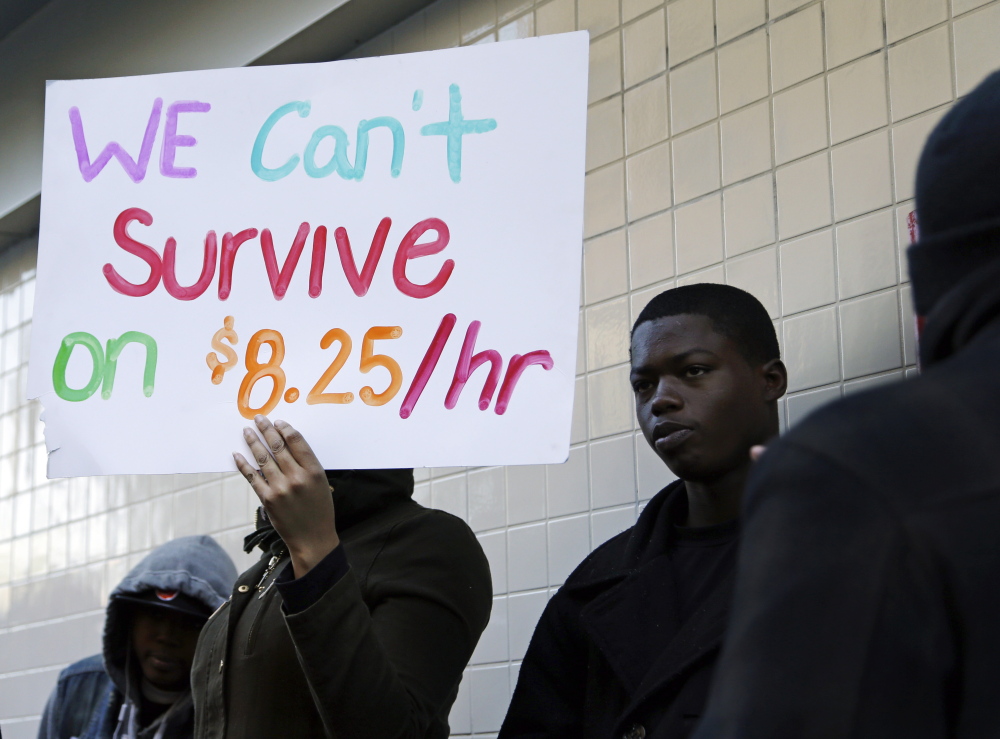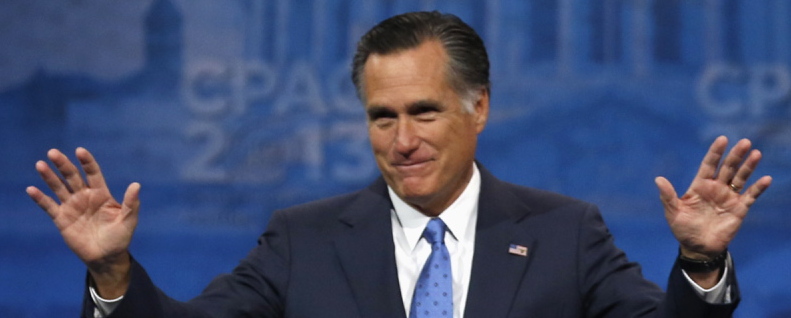Several leading Republicans have called for raising the federal minimum wage and others are speaking more forcefully about the party’s failure to connect with low-income Americans – stances that are causing a growing rift within the party over how best to address the gulf between the rich and poor.
With most tea party leaders in Congress and elsewhere opposed to a wage hike and intensely focused on dismantling President Obama’s health care law and his second-term agenda, the prospect for raising the minimum wage this year remains slim.
The growing party division, pitting GOP officials fearful of losing the support of workers against staunch conservatives who believe a wage hike would harm the economy, reflects Republican nervousness about the depth of their support ahead of the midterm elections, even though polls show them poised to retain their House majority and potentially take control of the Senate.
It also comes as Obama and his fellow Democrats are placing a heavy emphasis on income inequality with a number of votes in Congress and a series of populist speeches by the president – all part of an effort to energize the Democratic base and pressure Republicans to act.
THE LATEST FISSURE
The latest Republican fissure came Friday and involved the party’s 2012 presidential nominee, Mitt Romney, whose campaign was savaged by Democrats after he said that 47 percent of Americans are too dependent on government.
Appearing on MSNBC’s “Morning Joe,” Romney said he parts company “with many of the conservatives in my party on the issue of the minimum wage” and thinks “we ought to raise it.”
Romney, who has previously said that the federal minimum wage should be indexed to inflation, joined a group of prominent Republicans who have urged the party’s congressional wing to consider an increase.
The list includes former Minnesota governor Tim Pawlenty, who briefly ran for president in 2012, and former Pennsylvania senator Rick Santorum, another former 2012 contender who last month published a book lamenting the Republican Party’s reputation as “the party of Scrooge.”
“The issue has not yet risen to the level of attention it deserves, both inside and outside the party,” Pawlenty said in an interview. “Republicans may benefit from near-term tail winds this fall, but the demographic reality is that diverse voters have a diminishing view of Republicans and that needs to be addressed.”
Speaking Monday on MSNBC’s “The Daily Rundown,” Santorum voiced similar views. “Let’s not make this argument that we’re for the blue-collar guy but we’re against any minimum-wage increase ever,” he said. “It just makes no sense.”
In Senate races, Republican candidates are struggling to balance the aversion in the GOP base to increasing the minimum wage with their desire to win over working-class voters.
This week, establishment favorite Thom Tillis, the Republican Senate nominee in North Carolina, said he does not support raising the federal minimum wage, but left open the possibility of raising his state’s minimum wage. In Michigan, Senate candidate Terri Lynn Land, the front-runner for the GOP nomination, has said she is open to supporting a small wage increase.
This year in Illinois, GOP gubernatorial nominee Bruce Rauner said he made a “mistake” when he said he would reduce the state minimum wage and quickly pledged to back an increase.
In Congress, there is reluctance among Republicans, including from House Speaker John Boehner, R-Ohio, to follow suit. Cutting a deal with Democrats to gradually raise the federal minimum wage or extend long-term unemployment benefits, another issue sitting before House Republicans, is widely seen as playing on the president’s turf and unlikely to lead to immediate political gains.
According to Republican leadership aides in both chambers, Republicans believe they can avoid political fallout by instead promoting bills that would bolster federal job-training programs and reduce federal regulation. Looking to counter Democrats, House Majority Leader Eric Cantor, R-Va., has proposed several such bills.
“Democrats spend their days promoting policies that would do little but eliminate jobs,” Cantor said Wednesday at a news conference. “I’m hoping Democrats will lay down the battle axes.”
Raising the minimum wage “does not solve the problem,” said David Winston, a pollster who advises Boehner. “It is a step that could help some people, but it’s not the solution.”
Several public polls have found that most Americans support raising the federal minimum wage to $10.10 an hour – 69 percent said so in a March Bloomberg News poll, and 65 percent agreed in a February CBS News/New York Times survey. In the latter poll, sizeable majorities of independents (62 percent) and Democrats (86 percent) supported a wage hike, while 54 percent of Republicans opposed the idea.
Last month, Senate Republicans voted to block debate on a bill sponsored by Democrats to incrementally raise the federal minimum wage from $7.25 an hour to $10.10 an hour. Sen. Bob Corker of Tennessee was the lone Republican who voted to proceed.
A SIDE PROJECT
With a majority of congressional Republicans unwilling to take up the minimum wage, the party’s well-publicized push to appeal more to working voters remains a side project that is more about engagement in urban areas, not across the aisle.
What dominated the House last week, for instance, were efforts to investigate the State Department’s response to the 2012 attacks on a U.S. diplomatic outpost in Benghazi, Libya, and the Internal Revenue Service’s handling of conservative advocacy organizations’ applications for nonprofit status.
Rep. Paul Ryan, R-Wis., who was Romney’s running mate, is an example of how elected Republican leaders are trying to soften the party’s unpopularity with the poor without agreeing to back a wage increase.
This year, Ryan has spent weekends traveling to cities and meeting with faith-based community organizations, and he has published a 200-page report on federal anti-poverty programs. But when it comes to the minimum wage, Ryan firmly stands with Boehner.
Romney, however, says the GOP should do more than promise to enact Republican anti-poverty policies in the future. “I think we ought to raise it because, frankly, our party is all about more jobs and better pay,” he said Friday. “Communicating that is important to us.”
Send questions/comments to the editors.




Success. Please wait for the page to reload. If the page does not reload within 5 seconds, please refresh the page.
Enter your email and password to access comments.
Hi, to comment on stories you must . This profile is in addition to your subscription and website login.
Already have a commenting profile? .
Invalid username/password.
Please check your email to confirm and complete your registration.
Only subscribers are eligible to post comments. Please subscribe or login first for digital access. Here’s why.
Use the form below to reset your password. When you've submitted your account email, we will send an email with a reset code.